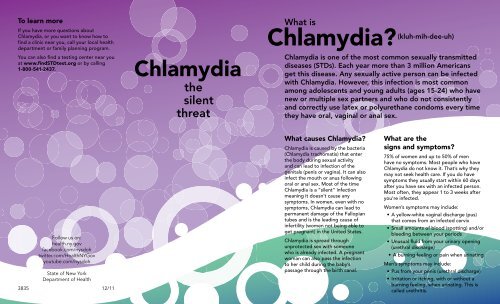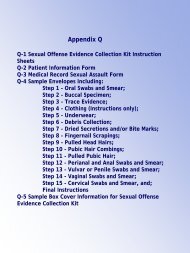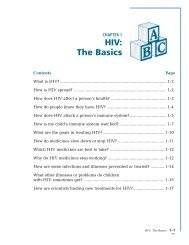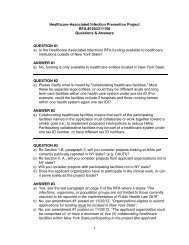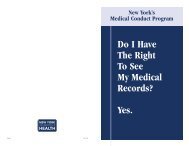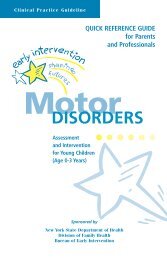Chlamydia: The Silent Threat - New York State Department of Health
Chlamydia: The Silent Threat - New York State Department of Health
Chlamydia: The Silent Threat - New York State Department of Health
You also want an ePaper? Increase the reach of your titles
YUMPU automatically turns print PDFs into web optimized ePapers that Google loves.
To learn more<br />
If you have more questions about<br />
<strong>Chlamydia</strong>, or you want to know how to<br />
find a clinic near you, call your local health<br />
department or family planning program.<br />
You can also find a testing center near you<br />
at www.findSTDtest.org or by calling<br />
1-800-541-2437.<br />
<strong>Chlamydia</strong><br />
the<br />
silent<br />
threat<br />
What is<br />
<strong>Chlamydia</strong>?<br />
(kluh-mih-dee-uh)<br />
<strong>Chlamydia</strong> is one <strong>of</strong> the most common sexually transmitted<br />
diseases (STDs). Each year more than 3 million Americans<br />
get this disease. Any sexually active person can be infected<br />
with <strong>Chlamydia</strong>. However, this infection is most common<br />
among adolescents and young adults (ages 15-24) who have<br />
new or multiple sex partners and who do not consistently<br />
and correctly use latex or polyurethane condoms every time<br />
they have oral, vaginal or anal sex.<br />
Follow us on:<br />
health.ny.gov<br />
facebook.com/nysdoh<br />
twitter.com/<strong>Health</strong>NYGov<br />
youtube.com/nysdoh<br />
<strong>State</strong> <strong>of</strong> <strong>New</strong> <strong>York</strong><br />
<strong>Department</strong> <strong>of</strong> <strong>Health</strong><br />
3835 12/11<br />
What causes <strong>Chlamydia</strong>?<br />
<strong>Chlamydia</strong> is caused by the bacteria<br />
(<strong>Chlamydia</strong> trachomatis) that enter<br />
the body during sexual activity<br />
and can lead to infection <strong>of</strong> the<br />
genitals (penis or vagina). It can also<br />
infect the mouth or anus following<br />
oral or anal sex. Most <strong>of</strong> the time<br />
<strong>Chlamydia</strong> is a “silent” infection<br />
meaning it doesn’t cause any<br />
symptoms. In women, even with no<br />
symptoms, <strong>Chlamydia</strong> can lead to<br />
permanent damage <strong>of</strong> the Fallopian<br />
tubes and is the leading cause <strong>of</strong><br />
infertility (women not being able to<br />
get pregnant) in the United <strong>State</strong>s.<br />
<strong>Chlamydia</strong> is spread through<br />
unprotected sex with someone<br />
who is already infected. A pregnant<br />
woman can also pass the infection<br />
to her child during the baby’s<br />
passage through the birth canal.<br />
What are the<br />
signs and symptoms?<br />
75% <strong>of</strong> women and up to 50% <strong>of</strong> men<br />
have no symptoms. Most people who have<br />
<strong>Chlamydia</strong> do not know it. That’s why they<br />
may not seek health care. If you do have<br />
symptoms they usually start within 60 days<br />
after you have sex with an infected person.<br />
Most <strong>of</strong>ten, they appear 1 to 3 weeks after<br />
you’re infected.<br />
Women’s symptoms may include:<br />
• A yellow-white vaginal discharge (pus)<br />
that comes from an infected cervix<br />
• Small amounts <strong>of</strong> blood (spotting) and/or<br />
bleeding between your periods<br />
• Unusual fluid from your urinary opening<br />
(urethral discharge)<br />
• A burning feeling or pain when urinating<br />
Men’s symptoms may include:<br />
• Pus from your penis (urethral discharge)<br />
• Irritation or itching, with or without a<br />
burning feeling, when urinating. This is<br />
called urethritis.
Can <strong>Chlamydia</strong> cause<br />
any other problems if it’s<br />
not treated?<br />
Yes! Untreated <strong>Chlamydia</strong> in women can<br />
lead to infection in other parts <strong>of</strong> your<br />
reproductive system. This infection is called<br />
pelvic inflammatory disease (PID). If you<br />
have PID it can cause belly pain, fever, and<br />
possible infertility (the inability to have<br />
children), ectopic pregnancy (a pregnancy<br />
outside the uterus), and chronic pelvic pain.<br />
In men, untreated <strong>Chlamydia</strong> can cause<br />
urethral infection, and complications such as<br />
swollen and tender testicles (epididymitis),<br />
which may result in sterility (inability to<br />
make sperm and father children).<br />
A pregnant woman with <strong>Chlamydia</strong> can<br />
give the infection to her baby during<br />
vaginal delivery. <strong>Health</strong> care providers give<br />
medicated eye drops to ALL newborns<br />
in <strong>New</strong> <strong>York</strong> <strong>State</strong> soon after birth. This<br />
prevents the newborn from getting an<br />
eye infection caused by <strong>Chlamydia</strong> or<br />
gonorrhea. About one <strong>of</strong> every four<br />
newborn babies delivered through the<br />
birth canal <strong>of</strong> an infected woman will get<br />
<strong>Chlamydia</strong> pneumonia (lung infection).<br />
A <strong>Chlamydia</strong> infection increases your<br />
chance <strong>of</strong> getting other STDs, such as<br />
gonorrhea or HIV.<br />
How will I know<br />
if I have <strong>Chlamydia</strong>?<br />
Since most women and many men do not have<br />
symptoms, it is important for all sexually active<br />
persons to have regular examinations so that<br />
a clinician can take specimens to screen for<br />
possible <strong>Chlamydia</strong> infection.<br />
A clinician will take a sample from the site <strong>of</strong><br />
infection (e.g., urethra, cervix, rectum, and/<br />
or the eye) using a swab and then test it for<br />
the bacteria. <strong>New</strong> tests are available that use<br />
urine samples to test for <strong>Chlamydia</strong>. However,<br />
this urine testing is not available at all provider<br />
<strong>of</strong>fices. Ask your doctor if this test is available.<br />
Is there a cure for <strong>Chlamydia</strong>?<br />
Yes. <strong>Chlamydia</strong> can be easily treated and cured<br />
with antibiotics. Your provider will give you<br />
a one-time dose <strong>of</strong> azithromycin (az ith roe<br />
mye’ sin) or a week <strong>of</strong> doxycycline (dox i sye’<br />
kleen) that should be taken twice a day. Other<br />
antibiotics are available but they are not as<br />
effective. <strong>The</strong>y all need to be taken for 7 days.<br />
If you finish your medicine and you still have<br />
symptoms, return to your provider.<br />
You can<br />
have<br />
<strong>Chlamydia</strong><br />
and not<br />
know it<br />
<strong>Chlamydia</strong><br />
easily treated and cured<br />
When can I have sex again?<br />
If you have been treated for <strong>Chlamydia</strong>,<br />
you should not have oral, anal or vaginal<br />
sex until 7 days after your treatment is<br />
over. If your sex partners are being treated<br />
for this STD, you should wait to have sex<br />
until 7 days after they take all <strong>of</strong> their<br />
medicine. You can get <strong>Chlamydia</strong> again<br />
if you don’t wait 7 days or if your sex<br />
partners don’t get treated.<br />
What about my partner(s)?<br />
<strong>Chlamydia</strong> is a sexually transmitted disease<br />
– your sexual partners should be both<br />
checked and treated for this disease even if<br />
no symptoms are present.<br />
Can I get this infection again?<br />
Yes. Past infection with <strong>Chlamydia</strong> does<br />
not make a person immune to the disease.<br />
From the time a person is infected with<br />
<strong>Chlamydia</strong>, he or she can spread the<br />
disease and continues to do so until<br />
properly treated. If your partner(s) are<br />
not properly treated before you have<br />
oral, vaginal or anal sex, or if you have<br />
oral, vaginal or anal sex without condoms<br />
(unprotected sex) you place yourself at risk<br />
for another infection.<br />
can be<br />
How can I prevent <strong>Chlamydia</strong>?<br />
Not having sex (abstinence) is the only sure<br />
way to avoid infection.<br />
To lower your chances <strong>of</strong> giving or getting<br />
<strong>Chlamydia</strong>, use a latex or polyurethane<br />
condom every time you have oral, vaginal<br />
or anal sex. Using condoms will not<br />
totally stop your risk <strong>of</strong> giving or getting<br />
<strong>Chlamydia</strong>. This is because condoms are<br />
not 100% effective. However, condoms<br />
greatly lower your risk <strong>of</strong> getting<br />
<strong>Chlamydia</strong>. <strong>The</strong>y also help prevent the<br />
spread <strong>of</strong> other STDs including HIV, the<br />
virus that causes AIDS.<br />
If you think you’re infected, or you have<br />
been exposed, do not have oral, vaginal or<br />
anal sex. You and your sex partner(s) should<br />
visit a health care provider for full physical<br />
checkups. <strong>The</strong>se include a complete sexual<br />
history and testing for common STDs. You<br />
and your partner(s) should be checked for<br />
gonorrhea, <strong>Chlamydia</strong>, syphilis, herpes,<br />
genital warts, trichomoniasis, and HIV. <strong>The</strong><br />
only way to protect yourself is by taking<br />
good care <strong>of</strong> your health. Your sex partners<br />
should also take good care <strong>of</strong> their health.<br />
Will anyone know the results<br />
<strong>of</strong> the exams?<br />
Your test results and any treatment will be<br />
kept absolutely confidential. No one can<br />
find out your results, except you. If you are<br />
under 18 you can be checked and treated<br />
for STDs without getting permission from<br />
your parents.


